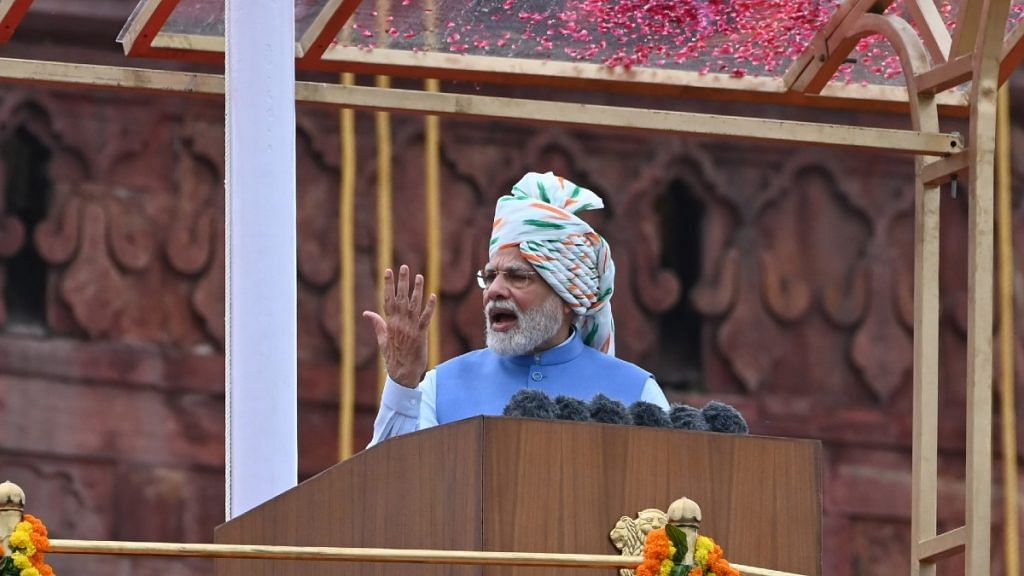New Delhi: Speaking from Delhi’s Red Fort on the occasion of Independence Day, Prime Minister Narendra Modi Monday expressed agony over an “ill habit” that he said the nation had developed — of at times “insulting women”.
“I’m agonised that due to some reasons, we have developed an ill habit of insulting women by our words and actions. We must vow we that in our behaviour, culture and everyday lives, we will not insult women,” Modi said, stressing on gender equality as one of the prans (pledges) the country needed to take in order to develop rapidly in the next 25 years, following which it will complete 100 years as an independent nation.
The PM’s comments come at a time when his party has come under criticism over the behaviour of Shrikant Tyagi — a Noida resident at the centre of the Grand Omaxe society controversy, who claims to be a member of the BJP’s Kisan Morcha. Tyagi was arrested earlier this month after a video of him purportedly using abusive language and physically assaulting a female resident of the Grand Omaxe residential complex went viral on social media.
Gender equality and respect for ‘Naari Shakti’ was a prominent theme in the prime minister’s speech as India celebrated its 75th year of independence. In fact, it has been a constant talking point in the PM’s Independence Day speeches since his first one in 2014, where he spoke about the ‘Beti Bachao, Beti Padhao’ initiative.
The other prans or pledges citizens needed to take for a fully developed India, according to the PM, are — complete decolonisation of thought, taking pride in India’s culture, observing unity in all aspects of society, and fulfilling civil duties.
While speaking about the need for equality in society, Modi also spoke about gender equality in the household. “At home, an example of unity is set when the son and daughter are treated equally. If the son and daughter are not equal, then that is not unity.”
The PM, whose party, the BJP, came to power in the Centre for a second consecutive time in 2019, asked the people of the nation to make changes in their behaviours that insult women. “Empowerment of women will be an asset to us in the process of nation-building. That is a potential I see.”
Citing examples of how this has happened in the past, Modi hailed the role of women such Rani Laxmibai, Jhalkaribai, Rani Chennamma and Begum Hazrat Mahal in the freedom struggle.
Also Read: Sonia & Smriti fight it out as ‘Rashtrapatni’ row sparks big BJP-Congress blowout in House
BJP & the female vote
Reports have previously suggested that Modi and thereby the BJP had won the popular vote of women in the 2019 Lok Sabha polls and in the states where the party has come to power since 2019.
Election Commission (EC) data since 1962 — which is when it started breaking down voter turnout in general elections by gender — shows that historically, at the national level, the Congress has always amassed a larger share of the female vote. However, that changed in 2019 when the Modi government came to power for the second time. The BJP, at 36 per cent (according to EC data), had won the highest number of female votes among all contesting parties.
The 2019 elections were also when women’s participation (66.79 per cent) in elections was almost the same as that of men (66.68 per cent), according to EC data. This, many said, marked the rise of the “silent woman voter” who was asserting her political choice. A similar trend was also witnessed in the Bihar elections of 2015.
Since 2019, therefore, the party focussed on cornering the female vote in every election that it has fought.
For example, in the most recent set of assembly elections to five states held in February-March this year, more women voted for the BJP than men.
The BJP’s growing popularity among women could also be attributed to economic schemes like the Pradhan Mantri Ujjwala Yojana, Swachh Bharat Abhiyan, Jan Dhan Yojana, Pradhan Mantri Awas Yojana and Beti Bachao, Beti Padhao which were targeted specifically at women.
(Edited by Gitanjali Das)
Also Read: ‘Not a common tailoring job’—Muslim women in Malerkotla stitch flags for Har Ghar Tiranga
